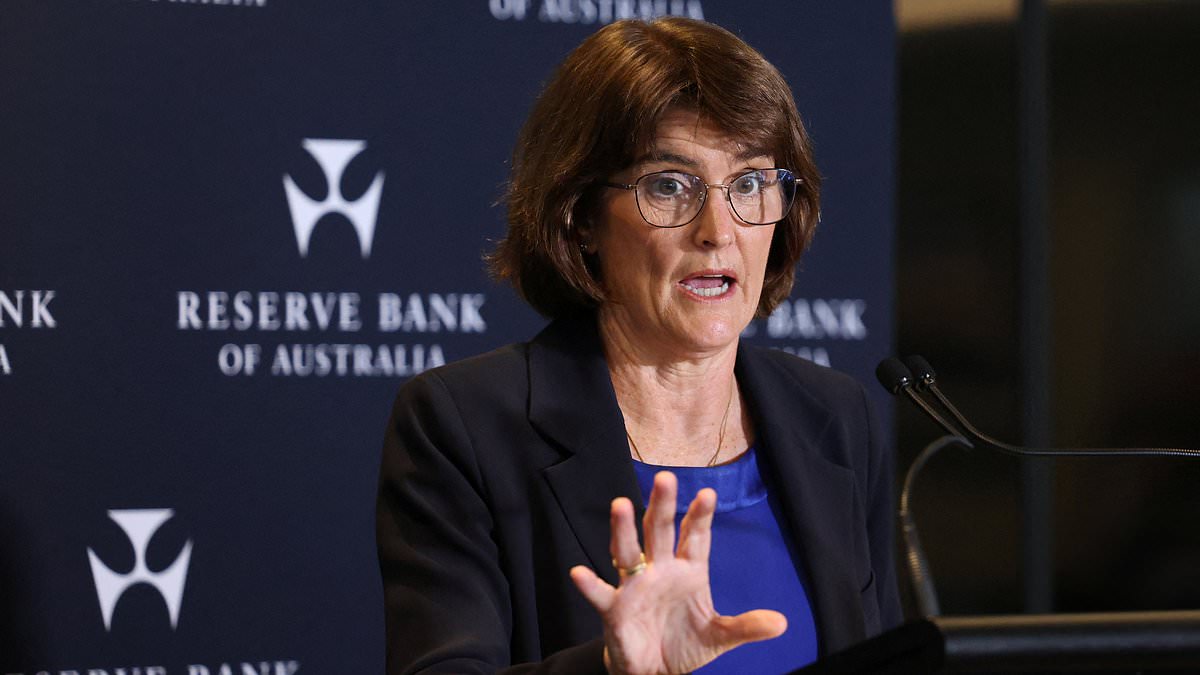By Editor,Matt Jones
Copyright dailymail

Reserve Bank boss issues a price shock warning to Australians: ‘Isn’t coming back down’
The cost of goods to continue to rise: RBA
READ MORE: Shocking graphic shows the value drop of $100 in Australia
By MATT JONES, SENIOR NEWS REPORTER, AUSTRALIA and AAP
Published: 05:40 BST, 22 September 2025 | Updated: 06:47 BST, 22 September 2025
The boss of the Reserve Bank has warned that while inflation is easing, the cost of essentials will remain permanently higher than before the pandemic – hitting vulnerable Australians the hardest.
RBA governor Michele Bullock addressed the House of Representatives Standing Committee on Economics this week and said: ‘While inflation has fallen materially, the price level isn’t coming back down.’
‘The higher price level has affected everyone – whether you’re paying a mortgage, renting, running a business or just trying to make ends meet,’ she said.
‘It’s been especially tough on people with lower incomes and those in more vulnerable situations.’
It comes after RBA assistant governor Sarah Hunter said last week that prices would never return to pre-pandemic levels.
‘The cost of living is now higher and we are not trying to bring the price level down,’ she said.
‘My personal price point on this is the milk I get in the supermarket every week, which is an awful lot more expensive than what it was pre-Covid.
‘The price of milk will not go back to where it was pre-Covid, same with bread, other staples, petrol and so on.’
RBA governor Michele Bullock sympathised with struggling Aussies when delivering bad news
The RBA was pressed by Teal MP Allegra Spender, who asked if housing supply was adequate and whether new policies risked inflating prices.
‘Yes you’re absolutely right it’s a supply issue and are we close to meeting it? All estimates suggest we are not,’ Ms Bullock answered.
She also explained that demand is being driven not just by population growth, but by the fact that households are getting smaller – for example, more people living alone or in smaller family groups.
So even if the population grows at the same rate, more homes are needed because each household now uses up more of the housing stock.
RBA head of financial systems Brad Jones said the Albanese government’s upcoming expansion of the first home buyer deposit scheme would slightly boost dwelling prices, according to the bank’s modelling.
By bringing forward purchases and raising borrowing capacity for first home buyers, overall housing credit could increase by around one to two per cent, the RBA estimates.
‘At the very margin, you may see a little more upward pressure on house prices in the short term, recognising that first home buyers account for about 20 per cent of the flow of new housing credit,’ Dr Jones said.
The RBA also highlighted that Australians would be paying more for their power bills in the coming months, with inflation predicted to peak in the first quarter of 2026.
According to the Australian Bureau of Statistics, electricity prices rose by 13 per cent in July after state rebates ended.
Aussies can expect to pay more for goods and prices will never drop back to pre-Covid levels
Ms Bullock also flagged risks from global politics, including Donald Trump’s tariffs on China, cyber threats, and the possibility of wars pushing up energy prices.
She said that financial markets appeared overly relaxed about these risks, warning that a sudden downturn could trigger a sharp reaction and threaten financial stability.
‘Certainly, high credit risk companies don’t seem to be observing high risk in their borrowings,’ she said.
‘There’s a slight concern that if things quickly turn in a bad direction, that the markets might react quite badly, and that might not be good for financial stability.’
But she said the RBA had room to move to respond to any geopolitically-induced financial crisis, given the cash rate was still at 3.6 per cent.
Markets have all but ruled out another reduction in September, but are expecting the bank to cut rates at its November meeting.
The monthly consumer price index for August, to be published by the Australian Bureau of Statistics on Wednesday, could tick up above three per cent, due to base effects around the timing of petrol and electricity price changes.
While this won’t help boost the odds for more rate cuts, it is unlikely to deter the RBA from its gradual easing path, given the board is wary of reading too deeply into the volatile headline figure.
But it will provide an early indicator for estimates of underlying price growth in expenditure categories the bank will watching closely, such as electricity prices and new dwelling costs, in the all-important quarterly data released in October.
Share or comment on this article:
Reserve Bank boss issues a price shock warning to Australians: ‘Isn’t coming back down’
Add comment



